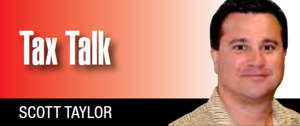Within the first 10 days of October we had two clients call to say how they were almost scammed by someone falsely claiming to be from Canada Revenue Agency.
One client received a phone call from someone who said he was from the CRA collections department. This “agent” told her she needed to pay her debt immediately or face jail time. Our client explained that if she owed any money, this was the first she’d heard of it. But the caller was relentless and she eventually gave in. She was told that she had 30 minutes to get to a Petro-Canada station, buy 10 pre-paid cards worth $250 each, and then provide the “agent” with the barcode numbers from the back of the cards. Thank goodness the craziness of this call gave her the confidence to hang up the phone.
Another client got an e-mail telling him that CRA needed more information in order to process a refund. He clicked on a link in the e-mail which opened a legitimatelooking Web site with a form asking for his name, address, SIN, etc. It was a classic “phishing” scam, where a site looks official but has coding designed to steal your personal or financial information. Isn’t it amazing what thieves can do today with technology at their disposal? Fortunately, our client realized something was wrong and closed up his browser before he pressed “send.”
Perfect foils
In a more low-tech scam making the rounds, thieves are mailing letters on CRA letterhead saying there is “insufficient information” on your tax return and an update is required before you can receive any “claims.” The letter includes a form specifically requesting details like your bank account and passport numbers.
Tax agencies like CRA are perfect foils for scammers. Innocent people will give them whatever they ask for because no one wants the taxman on his back.
CRA knows this. The agency says it never uses e-mail or voice mail to ask for personal information and will not divulge information about you to another person unless you provide formal authorization.
If you receive something suspicious and want to make sure it’s from CRA, call the agency yourself at 800-959-8281 for personal services or 800-959-5525 for business services. Agents will be able to confirm whether any CRA department is looking to contact you.
When in doubt, ask yourself whether the request is for information that you wouldn’t otherwise include with your tax return, or that you know CRA already has on file. If the caller or e-mail needs to “verify” your social insurance, credit card, bank account, or passport numbers, it’s not CRA.
Scammers everywhere
There are bad apples among taxreturn preparers, too. One ploy involves inflated receipts for charitable donations. The amount is increased by the gifting of supplies purchased with the actual donation to another organization. Typically, these involve computer or medical supplies.
These schemes may seem legitimate because a CRA Tax Shelter Identification Number is on the paperwork. But a tax shelter ID is no guarantee that you’re entitled to the proposed tax benefits. If your tax preparer is promoting a charity donation with a greater-than-normal refund potential, he’s on the take and getting a sales commission.
Some tax preparers will bend or break the rules even when calculating business expenses or losses to make themselves look like heroes. Others simply have no clue what they’re doing (anyone can hang out a shingle and call themselves a tax return preparation service).
I met a very nice couple last month that will be having us do their accounting and tax filings from now on because their former guy has “written everything off,” as the saying goes. Anything business or personal through the business account was expensed somewhere. Their personal tax returns were actually filed with zero income from the corporation. And now that they’re having some bad times, no bank will loan them money.
This couple said their tax guy never consulted with them about how he was getting their taxes to zero. He just went ahead and did it. Still, as harsh as this may sound, they signed their return. They’re responsible for making sure the information is correct.
While there is always a cost for doing things the right way, doing things the wrong way almost always costs more. The cost of getting duped by someone you thought you could trust, however, can be devastating both personally and financially.
The best way to protect yourself from fraud is to understand what you’re signing and who you’re dealing with. If you have questions, ask. If your gut tells you to seek a second opinion, trust it.
Scott Taylor is vice-president of TFS Group, providing accounting, bookkeeping, tax return preparation, and other business services for owner/operators.
Learn more at www.tfsgroup.com or call 800-461-5970.
